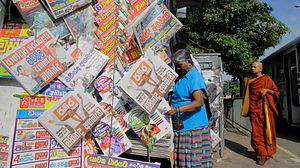Sri Lanka went into a constitutional coup on October 26, 2018 when President Maithripala Sirisena fired Prime Minister Ranil Wickramasinghe and replaced him with former President Mahinda Rajapaksa. Shortly after Rajapaksa was sworn in as prime minister, supporters of his party invaded Sri Lankan newsrooms to take control of some of the island’s main TV stations and forced journalists to change front pages of their print editions. Dharisha Bastians, editor of the Sunday Observer LK, was even commanded to surrender complete editorial control of the paper. This is what many journalists both in Sri Lanka and around the world feared when control was given back to Rajapaksa, who is well-known for being on the world’s list of worst press freedom predators, according to the organization Reporters Without Borders (RSF), which campaigns for freedom of information.
As a British Sri Lankan journalist myself, I fear for my fellow journalists on the island, some of whom I know have fled the country and some who are in the country and fear for their lives. The people of Sri Lanka have the right to democracy and journalists should not have to be placed in a situation where they have to fear for their lives in reporting in the interest of the public.
Many journalists have disappeared throughout the years when Rajapaksa was president. Others have been killed for holding views that go against the government. After the appointment of Wickramasinghe, many journalists felt they could again voice their opinions more openly, but the sudden reappointment of Rajapaksa leaves not only journalists but minority groups concerned over action that could potentially threaten stability in the country. Concerns over democracy and freedom of media independence are justified and the unjustified reinstatement of the former president brings back dark memories of Rajapaksa’s presidency for many in the industry.
“We cannot forget the state terror against journalists during the rule of Mahinda Rajapaksa,” Deputy Editor of the newspaper Anidda and former head of the Sri Lanka Working Journalists’ Association Lasantha Ruhunage told RSF. “So many journalists were harassed, attacked, and killed. There are reported cases of disappeared journalists.”
It is not only the rights of journalists that have been stripped. What happened to the rights of the people? The people of Sri Lanka should be given the right to choose who they want to govern the land. The people selected Wickramasinghe through a democratic vote and should be entitled to vote again if need be to choose who they want to govern them. Sri Lankan citizens should not have their rights stripped from them; they should not have to be told who is going to be prime minister based on the decision of the current president. The decision should always be with the people of Sri Lanka and this is one reason why there have been mass protests in the country demanding for democracy to be upheld and the parliament to reconvene.
As a Sri Lankan myself, I call on the government to ensure that journalists’ safety and editorial independence is upheld in the country so that news is presented to the public without interference from political authorities.
Frustratingly none of the promises that Siresena made back in 2015 in regards to investigating war crimes and good governance has been upheld. He now has appointed someone who would halt the process of accountability and justice against crimes toward journalists and minority groups on the island.
I stand with my Tamil, Muslim, and Sinhalese brothers and sisters in Sri Lanka to restore democracy and protect the rights of the media in the wake of this tragic constitutional crisis.
Tasnim Nazeer is an award-winning journalist, author, and UN Universal Peace Federation Ambassador. She has written for Al Jazeera English, CNN, BBC, Forbes, Entrepreneur and others. She was awarded the Ibn Battuta Award for Excellence in Media in 2013.

































